Our world changes when we dare to ask what if … What if our carriages could harness the strength of 100 horses? What if we could transport our voices across oceans? What if we could hold all the information we desired in the palm of our hands?
Science Fiction and Fantasy have been asking the great and powerful what if for generations. In fact, early speculative fiction seems to have predicted much of the technology we have now: 104 years before NASA launched Apollo-11, three Americans in Jules Verne’s From Earth to the Moon boarded a “space-bullet” in Florida, and decades before we had cellphones and 3D printers, characters on Star Trek were using communicator and replicator devices aboard the Starship Enterprise.
The power of speculative fiction has always been cemented in its ability to envision progress and paint it on the page. So, it’s no surprise that writers have explored the what ifs of social justice in tandem with technological progress, offering readers a glimpse of their own world’s failings and challenging their perspectives on issues that are far more complex than they first appear.
Though entertaining, these six works of speculative fiction, each with a heart for social justice, offer more to their reader after the book is closed. And who knows? Maybe one day we’ll cite one of these books as having inspired some social change before its realization.
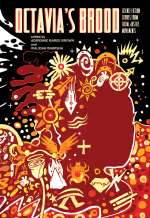
Science Fiction Stories from Social Justice Movements by Octavia’s Brood
Octavia’s Brood: Science Fiction Stories from Social Justice Movements (AK Press)
edited by Adrienne Maree Brown and Walidah Imarisha
Social activists, like speculative fiction, work tirelessly to envision a better world. In this anthology named for Black science fiction writer Octavia E. Butler, editors Adrienne Maree Brown and Walidah Imarisha have compiled 20 stories written by people who have dedicated their lives to fighting for social change alongside the works of recognizable names from the sci-fi world like Tananarive Due, Terry Bisson, LeVar Burton and Kalamu ya Salaam.
Spanning the subgenres of sci-fi, fantasy, horror and magical realism, these stories draw inspiration from social activism to imagine innovative outlooks on our current social and political spheres.
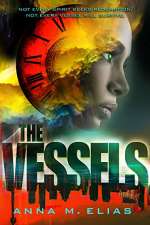
The Vessels by Anna M. Elias
The Vessels (Vesuvian Books)
by Anna M. Elias
Four broken strangers volunteer for the Vessels program — an initiative that uses humans to host spirits that have yet to cross over into Elysium, helping them find forgiveness, restore love and right wrongs from their pasts. But as the newest vessels prepare to take on their first assignments, they encounter a rogue spirit — a serial killer — who has no interest in redemption. Not every vessel will survive.
In this supernatural thriller where every spirit has the chance to atone — no matter what hurt or harm they caused in their mortal life — Elias challenges her readers’ ideas about forgiveness, an especially timely topic amid today’s brutal cancel culture. Emotionally compelling and complex, The Vessels reminds readers of the power in their connection to others. (Read our full review here.)
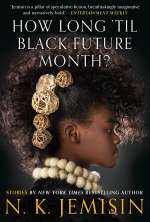
How Long ‘Til Black Future Month? by N.K. Jemisin
How Long ‘Til Black Future Month? (Orbit Books)
by N.K. Jemisin
This breathtaking and stellar first collection of short fiction by three-time Hugo Award-winner and NYT bestselling author N.K. Jemisin features 22 stories, some of which have been expanded into novels. Including her Hugo Award-nominated story “The City Born Great,” the collection boasts tales of spirits haunting the flooded streets of a post-Hurricane Katrina New Orleans; a utopian society determined to learn from the mistakes of our world, which readers may recognize as Jemisin’s answer to Ursula K. LeGuin’s “The Ones Who Walk Away From Omelas”; Fey in the Jim Crow South and many others.
Jemisin’s thought-provoking and bold narratives explore topics such as feminism, otherness, relationships, motherhood, power, fertility and dreams, taking a critical look at modern society.
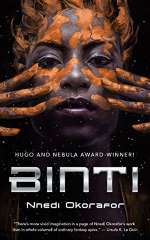
Binti by Nnedi Okorafor
Binti (Tor.com)
by Nnedi Okorafor
Knowledge comes at a cost for Binti. In order to attend the galaxy’s top university, she must give up her place among family and enter a world of strangers who don’t understand her culture. As she prepares to step into this new world, she finds herself in the middle of warring alien races. In order to survive, she’ll have to use all the tools at her disposal — those of her people behind her and of the prestigious institution ahead.
Winner of the Hugo Award and the Nebula Award for Best Novella, Binti navigates a vast cultural divide in a narrative that is both emotionally gripping and dynamic.
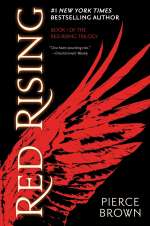
Red Rising by Pierce Brown
Red Rising (Del Rey)
by Pierce Brown
In this futuristic, color-coded society, the Red caste works tirelessly to make the surface of Mars inhabitable, a task they believe will create a better world for future generations. They’ve all been deceived. Darrow, a Red, discovers that humans reached the surface long ago and his people have been used as slaves for generations. In his quest for justice, he finds himself fighting for his life and the future of civilization in a brutal competition designed by the ruling Gold class.
Touching on economic inequality, Brown’s Red Rising examines one of the most recognizable social hierarchies that prominent speculative fiction authors have grappled with for years.

Vox by hristina Dalcher
Vox (Berkley)
by Christina Dalcher
In the vein of Margaret Atwood’s The Handmaid’s Tale and Naomi Alderman’s The Power, Christina Dalcher explores women’s rights in this dystopian tale where the government limits women to speaking 100 words per day. Non-verbal communication — sign language, writing of any kind, pantomiming — is also forbidden. Books have been banned, and women are no longer educated. Vox portrays the ambition and sacrifices of one mother as she tries to regain her own voice and fight the oppression facing all other women in this society.
With eerie parallels to our own world, Vox will give readers chills as they consider both the horrors of Dalcher’s tale and the significance in the re-emergence of feminist dystopian novels. (Read our full review here.)




